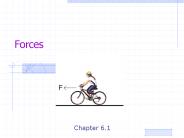Forces - PowerPoint PPT Presentation
1 / 21
Title:
Forces
Description:
Title: PowerPoint Presentation Author: W Richards Last modified by: school Created Date: 11/5/2001 8:13:52 AM Document presentation format: On-screen Show (4:3) – PowerPoint PPT presentation
Number of Views:25
Avg rating:3.0/5.0
Title: Forces
1
Forces
2
Distance, Speed and Time
- Dave walks 200 metres in 40 seconds. What is his
speed? - Laura covers 2km in 1,000 seconds. What is her
speed? - How long would it take to run 100 metres if you
run at 10m/s? - Steve travels at 50m/s for 20s. How far does he
go? - Susan drives her car at 85mph (about 40m/s). How
long does it take her to drive 20km?
3
Distance-time graphs
40 30 20 10 0
Distance (metres)
Time/s
20 40 60 80 100
4
40 30 20 10 0
Distance (metres)
Time/s
20 40 60 80 100
- What is the velocity during the first 20 seconds?
- How far is the object from the start after 60
seconds? - What is the velocity during the last 40 seconds?
- When was the object travelling the fastest?
5
Acceleration
- A cyclist accelerates from 0 to 10m/s in 5
seconds. What is her acceleration? - A ball is dropped and accelerates downwards at a
rate of 10m/s2 for 12 seconds. How much will the
balls velocity increase by? - A car accelerates from 10 to 20m/s with an
acceleration of 2m/s2. How long did this take? - A rocket accelerates from 1,000m/s to 5,000m/s in
2 seconds. What is its acceleration?
6
Velocity-time graphs
80 60 40 20 0
Velocity m/s
T/s
10 20 30 40 50
7
80 60 40 20 0
Velocity m/s
T/s
10 20 30 40 50
- How fast was the object going after 10 seconds?
- What is the acceleration from 20 to 30 seconds?
- What was the deceleration from 30 to 50s?
- How far did the object travel altogether?
8
Balanced and unbalanced forces
Reaction
Consider a camel standing on a road. What forces
are acting on it?
These two forces would be equal we say that
they are BALANCED. The camel doesnt move
anywhere.
Weight
9
Balanced and unbalanced forces
Reaction
What would happen if we took the road away?
Weight
10
Balanced and unbalanced forces
What would happen if we took the road away?
The camels weight is no longer balanced by
anything, so the camel falls downwards
Weight
11
Balanced and unbalanced forces
What would happen if we took the road away?
The camels weight is no longer balanced by
anything, so the camel falls downwards
12
Balanced and unbalanced forces
1) This animal is either stationary or moving
with constant speed
2) This animal is getting faster
4) This animal is also either stationary or
moving with constant speed..
3) This animal is getting slower.
13
Force, mass and acceleration
- A force of 1000N is applied to push a mass of
500kg. How quickly does it accelerate? - A force of 3000N acts on a car to make it
accelerate by 1.5m/s2. How heavy is the car? - A car accelerates at a rate of 5m/s2. If it
weighs 500kg how much driving force is the engine
applying? - A force of 10N is applied by a boy while lifting
a 20kg mass. How much does it accelerate by?
14
Terminal Velocity
Consider a skydiver
- At the start of his jump the air resistance is
_______ so he _______ downwards.
2) As his speed increases his air resistance will
_______
3) Eventually the air resistance will be big
enough to _______ the skydivers weight. At this
point the forces are balanced so his speed
becomes ________ - this is called TERMINAL
VELOCITY
15
Stopping a car
Too much alcohol
Tiredness
Too many drugs
Poor visibility
Wet roads
Icy roads
Tyres/brakes worn out
Driving too fast
16
Work done
When any object is moved around work will need to
be done on it to get it to move (obviously).
We can work out the amount of work done in
moving an object using the formula
Work done Force x distance moved in J
in N in m
Work done against frictional forces is
transferred mainly as heat.
17
Force and acceleration
If the forces acting on an object are unbalanced
then the object will accelerate, like this bear
Force (in N) Mass (in kg) x Acceleration (in
m/s2)
18
Kinetic energy
Any object that moves will have kinetic
energy. The amount of kinetic energy an object
has can be found using the formula
Kinetic energy ½ x mass x velocity squared in J
in kg in m/s
KE ½ mv2
19
Some example questions
- A 70kg boy is running at about 10m/s. What is
his kinetic energy? - A braking force of 1000N is applied by a driver
to stop his car. The car covered 50m before it
stopped. How much work did the brakes do? - What is the kinetic energy of a 100g tennis ball
being thrown at a speed of 5m/s? - A crane is lifting a 50kg load up into the air
with a constant speed. If the load is raised by
200m how much work has the crane done? (The
answer isnt 10,000J)
20
Momentum
- Depends on mass
- And velocity
- Momentum mass x velocity
- Is a measure of how difficult it is to change the
movement of an object.
mom mv
21
Momentum
- Is conserved (kept the same) in all collisions.































